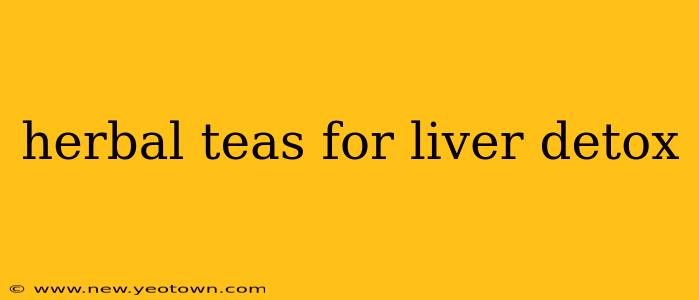The liver, our unsung hero, works tirelessly to filter toxins from our blood. But years of unhealthy diets, environmental exposure, and stress can take their toll. Many turn to natural remedies, and herbal teas have emerged as a popular choice for supporting liver health. This isn't about a quick "detox," a concept often misleadingly marketed, but rather about nurturing and supporting your liver's natural detoxification processes. This article will explore the potential benefits of specific herbal teas, addressing common questions and concerns.
What are the best herbal teas for liver health?
Several herbal teas are traditionally associated with supporting liver function. It's important to remember that these teas are complementary therapies, not replacements for medical advice. Always consult your doctor before making significant dietary changes, especially if you have underlying health conditions.
Let's embark on a flavorful journey, exploring some of the most popular choices:
Milk Thistle: This star of the liver-supporting herbal world boasts silymarin, a potent antioxidant known for its protective effects on liver cells. Imagine milk thistle as a tiny knight, defending liver cells from damage caused by toxins. Many studies suggest it can help regenerate liver cells and protect against liver disease. The earthy flavor of milk thistle tea can be surprisingly pleasant, often described as slightly bitter with nutty notes.
Dandelion Root: This humble weed is far from ordinary. Its root contains various compounds that promote liver function, acting like tiny helpers that encourage the liver to flush out toxins more effectively. Dandelion root tea has a slightly bitter, earthy taste that some find quite refreshing, especially when sweetened with a touch of honey. It also has diuretic properties, aiding in the body’s natural cleansing processes.
Burdock Root: This powerful root has a long history of traditional use for supporting liver and kidney health. Think of burdock root as a gentle cleansing agent, aiding in the removal of waste products from the body. The taste can be a bit earthy and slightly bitter, but many find it palatable, especially when blended with other herbs.
Artichoke: Artichoke leaves contain cynarin, a compound believed to enhance bile production, a crucial aspect of liver detoxification. Bile helps to break down fats and eliminate waste products. Artichoke tea often has a slightly bitter, vegetal taste, which can be surprisingly refreshing.
Ginger: While not exclusively a liver-supporting herb, ginger’s anti-inflammatory properties can be beneficial overall. Inflammation can negatively impact liver function, so including ginger in your routine can support overall well-being. The warm, spicy flavor of ginger tea is a comforting addition to any wellness routine.
Does herbal tea really detoxify the liver?
The term "detox" is often used loosely, and it's important to understand that the liver is already a remarkably efficient detoxification organ. These teas don't perform a "magical cleanse," but rather support the liver's natural detoxification processes. They can offer antioxidant protection, promote bile production, and aid in the elimination of waste products. Think of them as gentle allies, supporting your liver's innate ability to cleanse itself.
What are the potential side effects of herbal liver detox teas?
While generally considered safe, some individuals might experience mild side effects like upset stomach, diarrhea, or allergic reactions. It's always crucial to start with small amounts and monitor your body's response. People with allergies, pregnant or breastfeeding women, or those with pre-existing health conditions should consult their doctor before consuming these teas. Interaction with medications is also a potential concern, so a doctor's guidance is essential.
How much herbal tea should I drink for liver detox?
There's no magic number; moderation is key. Start with one or two cups a day and gradually increase the amount as tolerated. Listen to your body—if you experience any discomfort, reduce the amount or discontinue use. It's essential to remember that these teas support liver function, not replace healthy lifestyle choices.
Are there any interactions between herbal teas and medications?
Yes, certain herbal teas can interact with medications. Some herbs can affect liver enzymes, impacting how medications are metabolized. Always inform your doctor or pharmacist about any herbal supplements or teas you’re using, especially if you're taking prescription medications. This precaution ensures safety and prevents potential adverse interactions.
The journey to better liver health is a holistic one, encompassing a balanced diet, regular exercise, stress management, and adequate hydration. Herbal teas can be a valuable addition to this journey, but they are not a substitute for a healthy lifestyle and medical advice. Embrace the potential benefits of these natural remedies responsibly, always prioritizing consultation with your healthcare provider.

